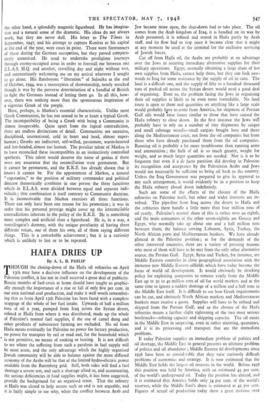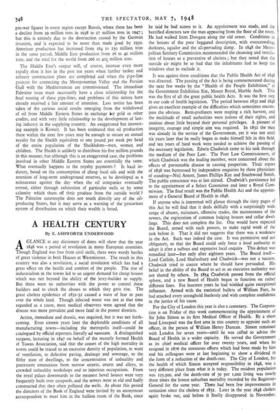HAIFA DRIES UP
By A. L. B. PHILIP
THOUGH the closing-down of the Haifa oil refineries on April 13th may have a decisive influence on the development of the Palestine conflict, it has not in itself received a great deal of publicity. Recent months of fuel crisis at home should have taught us graphic- ally enough the importance of a rise or fall of only five per cent. in our own national coal production, and make it well worth remember- ing that as from April 13th Palestine has been faced with a complete stoppage of the whole of her fuel intake. Upwards of half a million tons of oil a year, pumped from Iraq across the Syrian desert, refined at Haifa from where it was distributed, made up the whole of Palestine's normal fuel supplies, if the use of camel dung and other products of subsistence farming are excluded. No oil from Haifa means eventually for Palestine no power for factory production, no power for transport by rail or road and, for the household which is not primitive, no means of cooking or heating. It is not difficult to see where the suffering from such a paralysis in fuel supply will be most acute, and the only advantage which the highly organised Jewish community will be able to balance against the more diffused economy of the Arabs will be that of the limited hydro-electric power available from the Rutenberg grid. Still, both sides will find a fuel shortage a severe test, and such a shortage allied to, and accentuating, the serious deficiencies in food supplies might, it has been suggested, provide the background for an organised truce. That the refinery at Haifa was closed to help secure such an end is not arguable, and it is fairly simple to see why, when the conflict between Arab and
Jew became more open, the shut-down had to take place. The oil comes from the Arab kingdom of Iraq, it is handled on its way by Arab personnel, it is refined and stored in Haifa partly by Arab staff, and its flow had to stop once it became clear that it might at any moment be used at the terminal for the exclusive servicing of Jewish forces.
Cut off from Haifa oil, the Arabs are probably at an advantage over the Jews in securing immediate alternative supplies for their military operations. Egypt, normally obtaining a large share of her own supplies from Haifa, cannot help them, but they can look east- wards to Iraq for some assistance by the supply of oil in cans. The haul is a difficult one, and the supply of fifty to a- hundred thousand tons of packed oil across the Syrian desert would need a good deal of organising. Even so, the problem facing the Jews in organising their oil supplies is likely to be even more formidable. No land route is open to them and quantities on anything like a large scale would probably have to come from America, for shipment of Persian Gulf oils would raise issues similar to those that have caused the Haifa refinery to close down. In the first instance the Jews will probably have to rely on a number of tiny shipments by caique and small cabotage vessels—small cargoes bought here and there along the Mediterranean coast, not from the oil companies but from those who have already purchased them from the oil companies. Running oil is probably a lot more troublesome than running arms and ammunition ; the bulk of oil is so much greater, weight for weight, and so much larger quantities are needed. Nor is it to be forgotten that even if a de facto partition did develop in Palestine its recognition and acceptance by the Palestinian Arabs and Jews would not necessarily be sufficient to bring oil back to the country. Unless the Iraq Government was prepared to give its approval to any such arrangement, it would evidently be in a position to keep the Haifa refinery closed down indefinitely.
Such are some of the effects of the closure of the Haifa refineries on Palestine itself, but other and wider interests are in- volved. The pipe-line from Iraq across the desert to Haifa and the refineries there handle a little more than four million tons of oil yearly. Palestine's normal share of this is rather over an eighth, and the main consumers of the other seven-eighths are Greece and Egypt, who normally take up about one and a half million tons between them, the balance serving Lebanon, Syria, Turkey, the North African ports and Mediterranean bunkers. We have already glanced at the Palestine position ; as for the demands of the other interested countries, there are a variety of pressing reasons why most of them will have to be met from the only other alternative source, the Persian Gulf. Egypt, Syria and Turkey, for instance, are Middle Eastern countries in close geographical association with the immense new Middle Eastern oilfields which have today become the focus of world oil development. It would obviously be shocking policy for exploiting companies to remove yearly from the Middle East up to 3o to 4o million tons of oil for world markets and at the same time to ignore a sudden shortage of a million and a half tons in the Middle East itself. It is difficult to see how Greek requirements can be cut, and obviously North African markets and Mediterranean bunkers must receive a quota. Supplies will have to be refined and shipped from the Persian Gulf, and so the closure of the Haifa refineries means a further slight tightening of the two most serious bottlenecks—refining capacity and shipping capacity. The oil exists in the Middle East in surprising, even in rather alarming, quantities, and it is its processing and transport that are the immediate. problems.
If today Palestine supplies an immediate problem of politics and oil shortage, the Middle East in general presents an ultimate problem of politics and oil abundance ; Middle Eastern Oil developments since 1938 have been so considerable that they raise curiously difficult problems of economics and strategy. It is now estimated that the Middle East holds the largest oil reserves in the world. Before 1938 this position was held by America, with an estimated 45 per cent. of the world's underground oil. Today the position has altered, and it is estimated that America holds only 34 per cent. of the world's reserves, while the Middle East's share is estimated at 42 per cent. Figures of actual oil production today show a great increase over
pre-war figures in every region except Russia, where there has been a decline from 29 million tons in 1938 to 27 million tons in 1947; but this is entirely due to the destruction caused by the German invasion, and is expected to be more than made good by 195o. American production has increased from 164 to 250 million tons in the same period, Middle East production from x6 to 4o million tons, and the total for the world from 266 to 402 million tons.
The Middle East's output will, of course, increase even more rapidly than it has in the past ten years when further tanker and refinery construction plans are completed and when the pipe-line projects for connecting the Mesopotamian Valley and the Persian Gulf with the Mediterranean are commissioned. The immediate Palestine issue must necessarily have a close relationship for the final routing of these pipe-lines, and problems of this nature have already received a fair amount of attention. Less notice has been taken of the curious social results emerging from the withdrawal of oil from Middle Eastern States in exchange fior gold or other credits, and with very little relationship to the development of last- ing industry in the supplying country. An exaggerated but interest- ing example is Koweit. It has been estimated that oil production there within the next few years may be enough to secure an annual royalty for the Sheikh equivalent to one pound per week per head of the entire population of the Sheikhdom—men, women and children. The Sheikh is unlikely to distribute his five million pounds in this manner, but although this is an exaggerated case, the problems involved in other Middle Eastern States are essentially the same. What eventually happens to the royalty payments ? Is local in- dustry, based on the consumption of cheap local oils and with the retention of long-term underground reserves, to be developed as a reinsurance against the day when the oil companies eventually retreat, either through exhaustion of particular wells or by some calamity which shuts off their produce from the outside world ? The Palestine catastrophe does not touch directly any of the oil- producing States, but it may serve as a warning of the' precarious system of distribution on which their wealth is based.



































 Previous page
Previous page